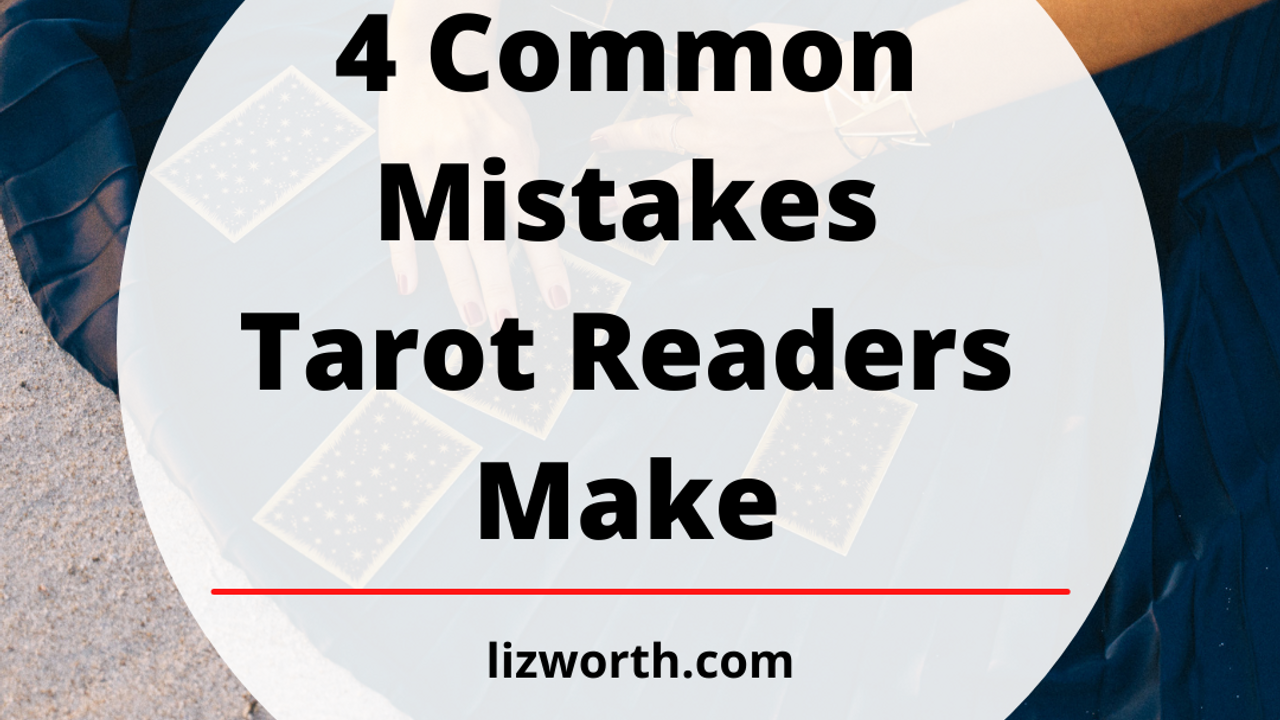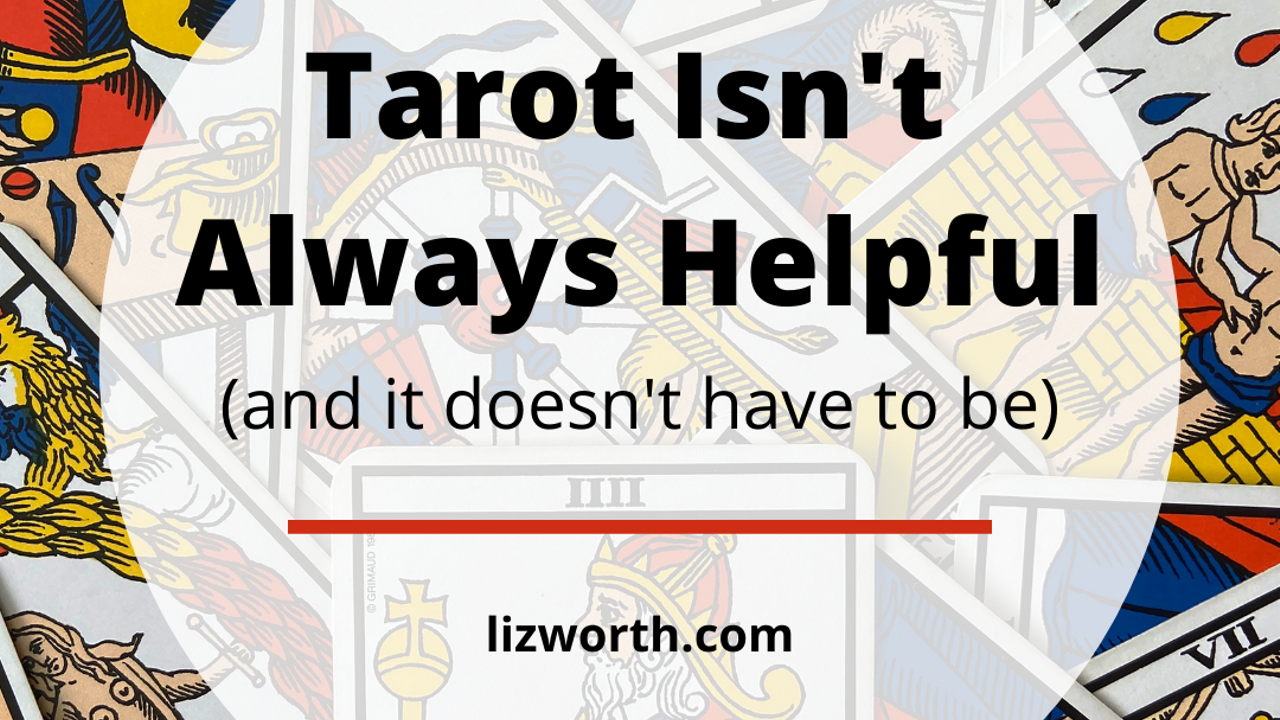What if your tarot reading is completely wrong?

Ever tried to predict something in a tarot reading and wondered when it will come to pass?
Or maybe you’ve read tarot for someone else and they really wanted to know the timing of something.
Has that happened to you before?
Does the thought of not knowing make you nervous?
Do you avoid predictive readings so that you don’t have to give a direct answer?
I used worry about these things, too.
And I was often confused about them, because so many people use tarot for predictive purposes, and yet it’s common to be discouraged from using tarot for predictions at all.
“Tarot can’t do this, and it can’t do that.”
But is that true?
I don’t believe it is.
In fact, the very first tarot reading I ever had was a predictive reading – and the messages I was given that day were still coming true 10 years later.
Wild, right?
Of course, this isn’t to say that a tarot reading is a promise or contract: It can be a glimpse at the potential of what’s to come, or what may unfold if you go down...
4 Common Mistakes Tarot Readers Make (That Actually Keep You Stuck)

Let me ask you something: What would it mean for you to become a better tarot reader?
What would you do with tarot?
How would you help yourself, or others?
I want you take a moment to think about your answers.
Now, ask yourself: What’s stopping you from getting to that point?
When people ask me how long it took for me to start reading tarot professionally (seven years), I always preface my answer with this:
There is no one timeline or linear path with tarot. It is an ongoing journey where you can always be learning.
Some people take less time than I did. Some take more. There is no right or wrong, and no perfect amount of time to measure your own progress against.
But there are things that held me back along the way that I do believe slowed me down. Not that I was in a rush to get anywhere with tarot, but if I could have gotten better a little bit faster, I would have taken that option in a heartbeat.
Some of the beliefs that I got stuck on were:
Mistake #1. Doing the same ty...
That time I blew it as a tarot reader

Years ago, before I was reading tarot professionally, I used to do a lot of tarot parties for friends to get practice.
I was at a café one night where a friend was having a trunk sale for a jewelry line she was selling. The room was full of my pal’s friends and family, and I didn’t know many people there.
A woman sat down for a reading with me. I laid down my cards. I saw something in them that was so specific: A story about a family inheritance.
Except that’s not what I told her.
Because what I thought did not match the meanings of the cards that were in front of me.
I wasn’t experienced enough yet to know how to trust myself as a tarot reader.
So I played it safe.
I gave a by-the-book reading – literally – rather than talking about what I’d initially seen.
And it wasn’t exactly wrong. But it wasn’t exactly right, either.
It was generic, safe, and middle-of-the-road enough for this woman to find something relatable in what I was saying.
But it wasn’t specific to what she was...
Are these two things holding you back as a tarot reader?

I remember how disappointed I was when I got my first tarot deck.
I went in with big expectations. I’d always thought of myself an intuitive, perceptive person. I felt spiritual.
And I wanted that connection to something greater – be it the universe, deity, or my higher self.
I was so excited, and a little bit nervous, when I shuffled my cards and started turning them over. I wondered: What would I learn? What would I see in my reading?
I went from excited to crushed pretty quickly. As soon as my cards were laid out, I felt…nothing. Well, that’s not entirely true: I didn’t get any visions or insights because I had no idea what to make of the cards in front of me.
But I did feel a mix of disappointment, confusion, and insecurity. That insecurity was directed towards myself: What if I’m not the spiritually connected, intuitive person I thought I was?
What if I’m just not cut out for tarot?
I know that sounds dramatic, and it is. I had gone into tarot with such high expectations, a...
Breaking free of the greatest tarot myth of all

There are tons of tarot myths out there.
But don’t believe everything you hear.
Because it’s not all true. And not everything you hear about tarot is helpful, either.
You want to know which myth I wish would disappear?
The belief that tarot readings have to complicated in order to be accurate.
There is something within our human nature that likes it when things feel hard.
So we go for the really complex, multi-layered tarot spreads.
Or we search for overly complicated tarot techniques, believing that that is where the answer to life’s mysteries exists.
Life is complicated enough.
Tarot doesn’t have to be.
I truly believe – no, I know – that the most powerful tarot readings don’t come from complicated techniques or approaches.
In fact, I think that the more convoluted tarot gets, the harder it can be to get to the heart of the answer you’re seeking.
I always come back to three main principles in my card readings:
- What is the question?
- What is the context?
- Which cards ...
The spiritual industry’s addiction to instant gratification

Please allow me to go on a little rant for a minute.
The spiritual industry has a problem with instant gratification.
I see it all the time in courses and workshops that lure you in with quick certifications, or that promise you spiritual attainment or mastery over a specific skill set in just a matter of days.
What am I talking about?
Beginner tarot programs that promise to give you the basics of tarot and teach you how to start charging for your readings…
Reiki classes that fast-track students through levels 1 and 2 within the span of a single weekend…
Priestess trainings in a matter of hours…
The list goes on.
Before I start to sound like a gatekeeper, I’ll say this: Taking a quick class or weekend workshop to get a taste of something is fine.
If you don’t have the time to commit to a longer training, or you’re not sure you’re ready to make a long-term commitment to a divination practice or spiritual path, there is nothing wrong with taking in a class here and there and ...
Tarot Isn't Always Helpful

A common trait that many tarot readers share is that we want to help other people.
Whether you still consider yourself a student of tarot, or you read professionally, I’d bet there’s a good chance you’ve been called to read cards out of the desire to be of service in some capacity.
But good intentions can backfire. Sometimes, the desire to help can actually leave your querent feeling insulted, put down, and unheard.
Why? Whether you’re reading tarot for practice or professionally, you’ll have to navigate the numerous perspectives and beliefs about tarot that are out there.
Some people see tarot as a predictive, psychic tool.
Others see it as a psychological one.
Some use it for self-exploration, healing, and reflection.
And some people seek out tarot readings for fun, entertainment, and curiosity.
In short, there are a lot of reasons why people seek out readings. And the more you read for the public, the more you’ll realize that your average tarot client won’t know much about t...
What does it take to read tarot professionally?

Not everyone wants to read tarot at a professional level.
It’s more than okay for tarot to be a hobby, an interest, and a personal outlet.
But it’s also okay to want to read tarot for other people, and even build a business out of it.
One of the reasons why I talk so much about reading tarot for others is because I meet so many people with a deep desire to do just that.
There is something about tarot that attracts compassionate helpers. We see the potential that tarot has when it comes to bringing clarity to a problem, opening up new perspectives, and holding space for meaningful conversation.
A lot of us want to use tarot to do something good in the world.
But there are differences between reading tarot personally versus professionally. Pulling out tarot cards for fun with friends comes with different expectations than reading for a paying client.
Those expectations don’t just happen on the client’s side. You, as a tarot reader, have to put new expectations upon yourself to ris...
5 Unexpected Ways to Become a Better Tarot Reader

I was reading an interview with a celebrated occult writer last year and was surprised when he admitted that he almost only reads esoteric books.
When I’m scrolling through my social media feed, I often stop to look at posts about what people in the tarot community are reading. And usually those updates feature books about tarot, divination, spirituality, or magic.
When you’re passionate about something, you tend to gravitate towards it. And I spend my fair share of time reading about tarot, too.
Sometimes my tarot students have confessed that they feel pressured to read every single thing they can about tarot – even if it’s at the expense of making time to explore other interests or give their intellects a break by changing the topic.
I don’t think there’s anything wrong with setting out to gain a substantial level of knowledge – in fact, I encourage it. Tarot, spirituality, and the occult are lifelong paths on which we are always learning.
But if you want to be a well-rounded ta...
Tips To Push Your Tarot Skills

People talk about tools like tarot and other esoteric practices as though they are shortcuts or hacks that will accelerate their paths to success.
Which is why I always feel so boring in that broken-record-kind-of-way when I say that learning tarot doesn’t come with any shortcuts.
To get good at tarot, it takes practice, commitment, and consistency.
Like anything else, if you keep showing up for it, put in the time, and push yourself to improve, things will change.
Which is what happened to one of my students last year, Nat. In early 2020, she sent me an email worried that her progress was slow: “I don’t think I’m very good at this.”
I told her to keep practicing, keep going.
I know that’s the key, because when I was in Nat’s position, I hit walls, too. And I have had to embrace the same learning curves in tarot as everyone else.
So I know how much can change with practice and consistent effort.
And now, a little over a year later, Nat is doing readings for her friends and fami...
